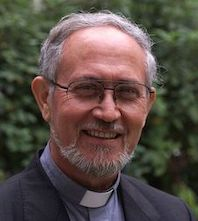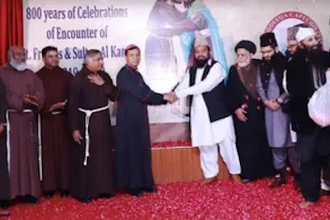Dialogue starts from God and brings people back to God

Rev Sebastian D'Ambra
Rev Sebastian D'Ambra, a missionary of the Pontifical Institute for Foreign Missions (PIME), was honoured with the Bishop Jorge Barlin Golden Cross Award for his outstanding contributions to the Catholic Church in the Philippines, with a focus on Christian-Muslim relations. In an interview conducted by Joseph Victor Edwin SJ, Rev D'Ambra reflects on his experiences and insights gained from his mission work among Muslims. Below are selected excerpts from the interview.
Congratulations, Fr Sebastian D'Ambra, on receiving the Bishop Jorge Barlin Golden Cross Award. Could you please provide some insights into the Silsilah movement, Emmaus Dialogue Community and the Emmaus College of Theology that you initiated to promote dialogue between Christians and Muslims in the Philippines?
I initiated the Silsilah Dialogue Movement in 1984 after spending several years doing mission work in a remote area of Mindanao during the Martial Law under President Marcos. This was the time of the father of the current president of the Philippines.
I arrived in Mindanao in 1977 with a focus on the Christian communities and the Subanon, a tribal group in the mission of Siocon, Zamboanga del Norte. However, I soon shifted my attention to the Muslim community due to the ongoing conflict between the Moro National Liberation Front (MNLF), consisting of Muslims, and the government. Living in a Muslim community, I befriended the locals and gained their respect. The MNLF group in the area even asked me to be their negotiator to facilitate their surrender and return to their families. This period was challenging, often spent living with the rebels in the forest, but it was also enriching, as I gained a deeper understanding of their aspirations and frustrations. After two years, the negotiation was successful, but I encountered trouble with the military and had to leave the Philippines, returning to Italy.
In Italy, I studied Islam and Arabic at PISAI (Rome), which led me to reflect deeply on the true meaning of dialogue. I realized that a spiritual approach was essential for genuine interreligious dialogue with Muslims.
Upon returning to Mindanao, I shared my understanding of dialogue with the Muslims, proposing the spirit of the "Great Jihad" (the struggle for internal purification according to the spirit of Sufism in Islam) and to the Christians, the Beatitudes of Jesus from the Gospel of Matthew (5:1-12), the "Magna Carta" of Christianity. This became the foundation of the dialogue I proposed to some Christian and Muslim friends in Zamboanga City in 1984 when I started the Silsilah Dialogue Movement. Despite the high levels of prejudice and animosity between Muslims and Christians, I found friends who were convinced of the new movement, guided by the idea that "Dialogue starts from God and brings people back to God."
This principle guided us to promote the spirituality of life-in-dialogue, encouraging members to live and promote the culture of dialogue as a way to peace. We agreed that the spirituality of life-in-dialogue should be nurtured through dialogue with God, oneself, others, and creation. This new approach was revolutionary, as the primary focus of dialogue in Mindanao had previously been on controlling conflict and animosity between Muslims and Christians.
Thanks to God, Silsilah began to grow in various ways. Our first program was a summer course on Muslim-Christian dialogue for our members, which has been held annually since then. This year marks the 38th summer course. One key aspect of the course, in addition to teaching Christianity and Islam, is the immersion program where Christians live with Muslim families and vice versa.
Over time, Silsilah's programs expanded to include initiatives such as small schools in poor areas, care for orphans from conflict situations, prison outreach, promoting dialogue and peace among Filipinos abroad, meetings of Muslim and Christian leaders, youth groups, and the Harmony Prayer, which is now spread in about 30 countries. We also promote environmental dialogue to protect Mother Earth, the World Interfaith Harmony Week, and the Dialogue with Creation Partners Week in October. We have published various books and other materials.
The emergence of Silsilah and other dialogue initiatives in Mindanao prompted the Catholic Bishops' Conference of the Philippines (CBCP) to focus more on interreligious dialogue, establishing a specific commission. Bishop Capalla, the first chairperson of this commission, appointed me as the first executive secretary in 1989, allowing me to have an office in Zamboanga City near the Silsilah centre. This marked the beginning of my collaboration with the CBCP on interreligious dialogue.
In 1992, my dear friend Fr. Salvatore Carzedda, PIME, was killed during a Silsilah summer course by a terrorist group opposed to Muslim-Christian dialogue. As I was also a target, I was sent back to Italy for my second "exile." Despite this devastating situation, we continued to move forward in the spirit of "Padayon" (move on).
The Emmaus Dialogue Movement emerged from Silsilah in 1987, formed by Catholics dedicated to the mission of dialogue and peace. The initiative began with Aminda Sano, now president of Silsilah and director of interreligious dialogue for the Archdiocese of Zamboanga. Initially composed of Catholic teachers, the group later opened to other Catholics and was approved by the diocese as a private lay association. Today, it includes lay consecrated men and women, married couples, priests, sisters, seminarians, youth, and even a bishop.
From this experience, we established the Emmaus College of Theology, majoring in Interreligious Dialogue, to form Catholic boys and girls as leaders in the Church and society in the spirit of dialogue.
What developments are encouraging, promising, or hopeful in contemporary Christian-Muslim relations?
In the context of contemporary Christian-Muslim relations, I draw inspiration from the concept of "Human Fraternity" as articulated in the 2019 Abu Dhabi document, a pact signed by Pope Francis and the Grand Imam of Al-Azhar University. This document underlines the significance of fostering a Culture of Dialogue, a principle deeply embedded in the spiritual ethos of engaging in dialogues at Silsilah. It is imperative to reexamine the profound essence of dialogue, underpinned by love and reverence for all, to nurture solidarity across various domains, particularly in Dialogues with Creation and other specific requirements pertinent to our geographical and cultural milieus.
In the Philippines, I have been continuing various initiatives in line with the Human Fraternity Document and the spirit of Synodality. One of my significant achievements was publishing a manual on interreligious dialogue, which received the Card Sin Award for best book in ministry. I have also authored other books, some of which are available on the web (see: www.silsilahdialogue.com). During the COVID-19 pandemic, despite travel restrictions, I sent my books to bishops and universities to share ideas and the spirit of dialogue.
The Emmaus College of Theology, specializing in Interreligious Dialogue, aims to form Christian leaders open to interreligious dialogue. It is approved and recognized by the Commission on Higher Education (CHED). Students receive comprehensive academic and spiritual formation at Harmony Village, Zamboanga City, where Silsilah conducts most of its activities (see www.emmauscollegeoftheology.com).


















